JUN 10, 2025 – Day 3 of Washington D.C. Visit, Meeting at the U.S. State Department
Hello. Today is the third day in Washington D.C., where Sunim is meeting with U.S. government officials, Congress members, and think tank representatives for peace on the Korean Peninsula.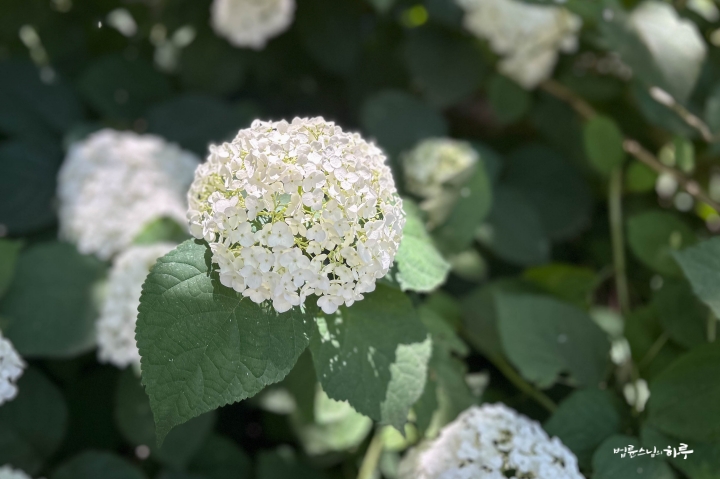
This morning, Sunim had consecutive meetings scheduled with three departments at the U.S. State Department: the Asia-Pacific division and Korea-related divisions. Since the State Department’s security screening process takes longer than Congress, Sunim decided to leave earlier than yesterday.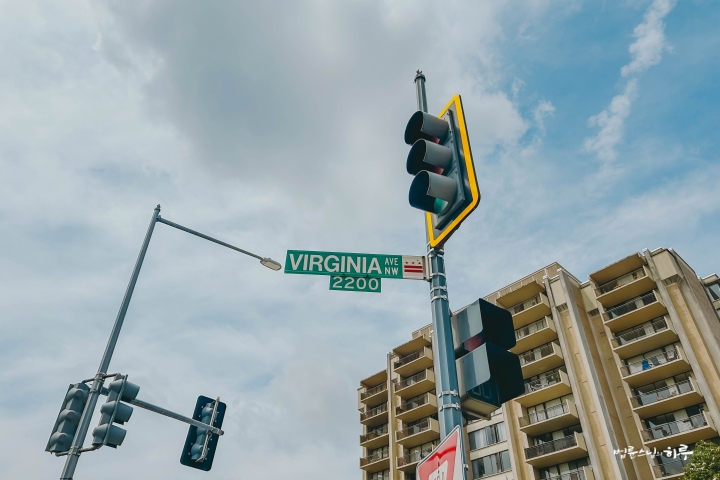
After completing morning practice and breakfast, Sunim departed at 7:45 AM for the State Department located in southwest Washington D.C. When Sunim arrived at the State Department’s visitor security checkpoint, a Korean staff member was waiting.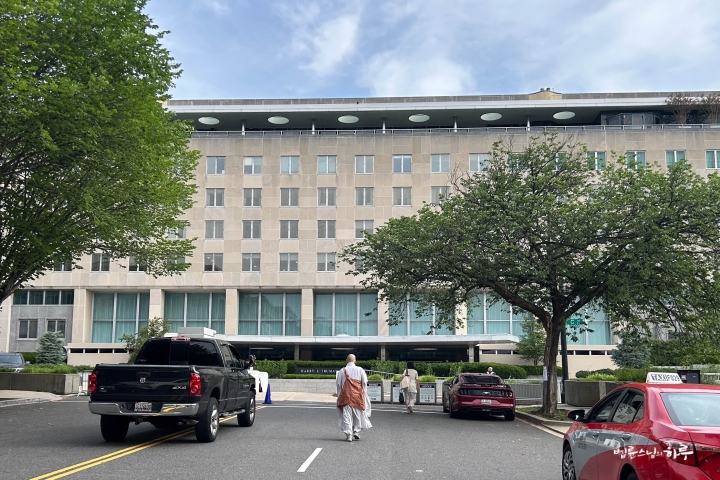
“Venerable Pomnyun Sunim, welcome to your visit to the State Department. Everyone is looking forward to meeting you.”
After completing the procedures, Sunim moved to the office of Kevin Kim, Deputy Assistant Secretary for East Asia and the Pacific. Deputy Assistant Secretary Kevin Kim warmly welcomed Sunim.
“Venerable, it’s been a long time since we’ve seen you. Have you been well? Sunim, Jason, and Dr. Kim Soon-young have been working as a team for over 20 years.”
After exchanging greetings, they entered the Deputy Assistant Secretary’s office for a conversation. Kevin Kim mentioned that there have been many personnel changes since President Trump’s inauguration, and the State Department is also undergoing departmental reorganization, making it a very busy time. Sunim thanked him for making time despite his busy schedule and then explained the purpose of his visit to the United States.
“The purpose of this visit to Washington is to contribute, even if just a little, to advancing dialogue between the U.S. and North Korea, establishing lasting peace on the Korean Peninsula, and enabling humanitarian aid for North Korean people. After meeting various people this time, I’ve heard that Kevin, you are the most suitable working-level official for improving U.S.-North Korea relations. I hope you will put in a great deal of effort to open channels for dialogue between the U.S. and North Korea and normalize relations early in President Trump’s term.”
Since Kevin had long observed Sunim’s peace activities on the Korean Peninsula, efforts to improve U.S.-North Korea relations, and humanitarian aid work for North Korea, they could quickly continue their conversation while sharing ideas. As the meeting was coming to an end, Kevin asked who Sunim had come to meet in Washington this time. Sunim answered.
“I came to meet you, Kevin. Now that we’ve had this meeting, I’ve completed everything I needed to do on this visit. Usually when I come to Washington, I visit the White House National Security Council (NSC). Since there’s currently no one at the White House to lead U.S.-North Korea dialogue, I hope you, Kevin, will take the lead in opening channels for dialogue between the U.S. and North Korea.”
Kevin also responded that he would make efforts. The two continued their in-depth conversation about improving U.S.-North Korea relations and resuming humanitarian aid, even going beyond the scheduled time. Sunim promised to meet again during his fall visit to Washington and presented the newly published English edition of “The Revolutionary Buddha” as a gift.
Next, Sunim moved to the State Department’s Democratic People’s Republic of Korea (DPRK) Unit to discuss resuming humanitarian aid to North Korea. He had a conversation with not only the DPRK Unit staff but also four staff members from humanitarian aid-related departments. The staff explained that due to the transition from the Biden to Trump administration, there have been many personnel changes among department heads, causing delays in policy decisions. Sunim continued the conversation by asking various questions about humanitarian aid and listening to their answers. From the staff’s explanations, it became clear that due to the nature of their work, which requires handling legal issues, various experts including lawyers were participating in humanitarian aid operations. Sunim concluded the conversation by requesting,
“I hope you will work to resume humanitarian aid to North Korea soon.”
Finally, Sunim moved to another location to have a conversation with State Department intelligence staff. A staff member who had participated in the earlier humanitarian aid team discussion joined them, saying he wanted to hear more from Sunim.

Upon entering the next conference room, five State Department intelligence staff members were seated. Sunim apologized for being slightly late due to the previous meeting running long and exchanged greetings. Since the State Department was a place Sunim had visited for a long time, there were familiar faces as well as staff members he was meeting for the first time today. Sunim briefly introduced the activities of JTS (Join Together Society), Good Friends, and the Peace Foundation.
“JTS has been providing humanitarian aid related to North Korea, Good Friends has been working to improve the situation of North Korean refugees and human rights while publishing ‘North Korea Today,’ and the Peace Foundation has been continuing policy proposals and research for lasting peace on the Korean Peninsula and improving U.S.-North Korea and inter-Korean relations.”
Afterwards, they had a Q&A session with staff members. A State Department staff member asked about North Korea’s position on dialogue with the United States, expressing curiosity about what North Korea thinks about dialogue with the US and asking what should be done to resume dialogue. Sunim shared specific methods with the
How Can the United States and North Korea Resume Dialogue?
“As far as I know, North Korea’s position is that they do not cling to dialogue with the United States. At the same time, they maintain that the door for dialogue is always open. However, they say it’s difficult to engage in dialogue when being treated with hostility while being asked to talk. For example, it’s difficult to have dialogue when conducting aggressive military exercises while asking for talks, or imposing economic sanctions while requesting dialogue. Even if dialogue occurs, there would be no results. In other words, they don’t want dialogue just for show. However, if not treated with hostility, North Korea is said to be able to engage in dialogue at any time.
North Korea now seems to have sufficiently resolved its survival issues. First, while they were isolated in the international community five years ago, now with the UN Security Council divided, they belong to one side of that division, eliminating the risk of facing more economic sanctions. Second, by forming a military alliance with Russia, their security issues have been supplemented and military technology has improved. Most importantly, economically, while still poor, they seem to have avoided a crisis. So they no longer appear to be clinging to dialogue with the United States.
Considering this situation, if the United States wants to start dialogue with North Korea, it seems that it should not approach it the same way as five years ago. At that time, because North Korea’s position was very weak, the carrot and stick policy could be used, but now it’s useless. North Korea’s national goal is to become a strong and prosperous country. While they can be considered to have achieved being a strong country, they haven’t yet achieved being a prosperous country. To become a prosperous country, improving relations with Russia alone is not enough. Because of this aspect, I think North Korea has the possibility of engaging in dialogue with the United States. In other words, it’s difficult to economically rebuild the country without normalizing U.S.-North Korea relations. They recognize this point too.
President Trump is trying to create a new international order. And new policies need to be driven early in the term; if started late in the term, they cannot be completed. So it would be good for President Trump to start dialogue with North Korea early. I think President Trump sending a personal letter to Chairman Kim Jong-un could be a more decisive key than any working-level contact. This is because North Korea values the authority of its supreme leader most. In North Korea, no one except the supreme leader has the authority to decide on this matter.”
They continued to discuss various topics including North Korea’s economic situation, methods to enable humanitarian aid, and ways to resolve human rights issues.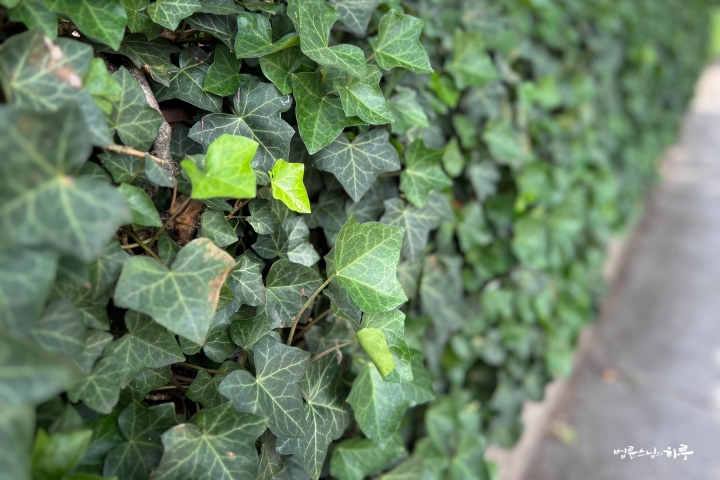
After finishing conversations with three departments at the State Department all morning, less than an hour remained until the next appointment. There wasn’t enough time for a proper lunch. After a simple meal of sweet potatoes and roasted chestnuts prepared at the center, Sunim moved to the next appointment location.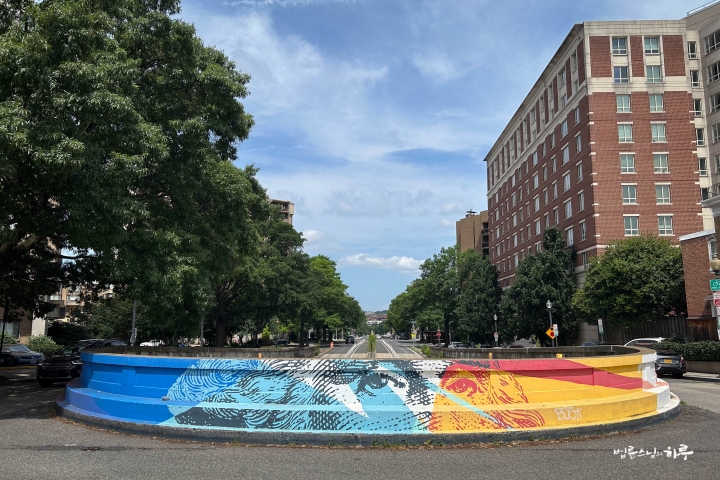
The next schedule was a meeting with Dr. Eberstadt, the Henry Wendt Chair in Political Economy at the American Enterprise Institute (AEI), a conservative American think tank. Since Sunim couldn’t visit Washington D.C. during the COVID pandemic and had difficulty visiting AEI due to scheduling over the past two years, this was a reunion after a long time.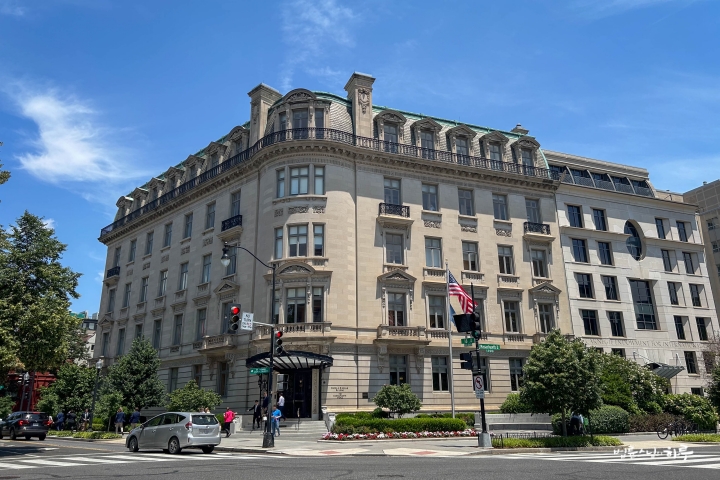
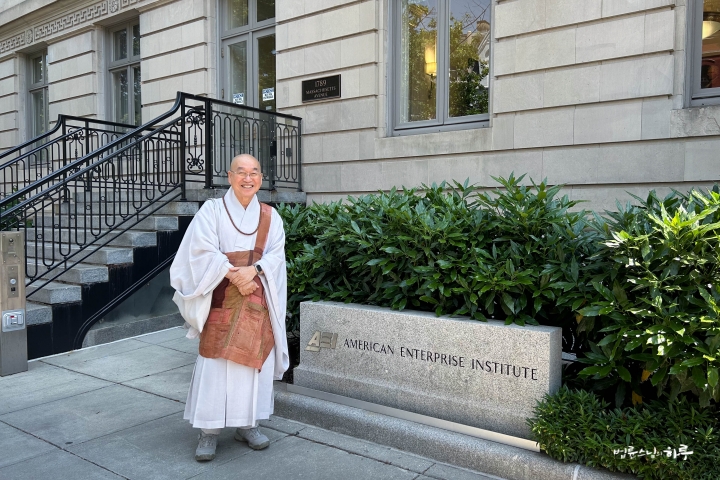
When Sunim arrived at the American Enterprise Institute at 1 PM, Dr. Eberstadt warmly welcomed him.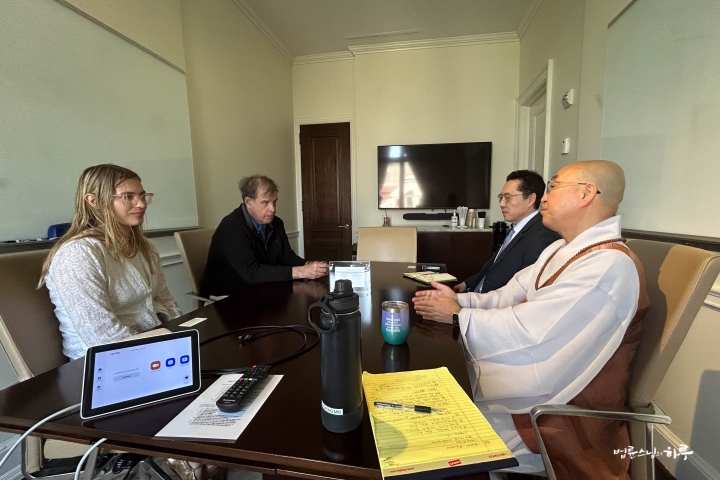
“It’s more difficult to obtain accurate information about North Korea these days than it was in the late 1990s. It’s truly wonderful and gratifying to meet with Venerable Pomnyun Sunim again during such times.”
Sunim shared the recent situation in North Korea and talked about various aspects of why the United States should engage in dialogue with North Korea.
“North Korea already possesses nuclear weapons. If North Korea currently has 10 nuclear weapons, the question is whether to stop them at the current state or let them continue until they have 50 or 100. Demanding denuclearization is practically difficult. In that sense, I think the United States should contain nuclear weapons through dialogue with North Korea.”
“That’s a very interesting and important point. What I’m curious about is how we can make North Korea believe that the United States has no intention of attacking North Korea?”
“I think it can be resolved by normalizing U.S.-North Korea relations. When South and North Korea simultaneously joined the UN in 1991, South Korea established diplomatic relations with China and Russia. However, North Korea failed to establish diplomatic relations with the United States and Japan. I think this is where the problem arose. This asymmetric situation led North Korea to begin nuclear development. If we normalize U.S.-North Korea relations and abandon the hostile policy, trust will naturally be restored. To normalize U.S.-North Korea relations, we need to reach an agreement on a nuclear freeze and suspension of economic sanctions.”
They also discussed various topics including North Korea’s economic situation, North Korean human rights issues, and humanitarian aid issues.
When they finished their conversation at 2:30 PM and came out of the building, the temperature exceeded 30 degrees Celsius with high humidity, feeling like midsummer in Korea. Sunim briefly talked with Jason in the shade, expressing gratitude for his valuable time interpreting over the past three days.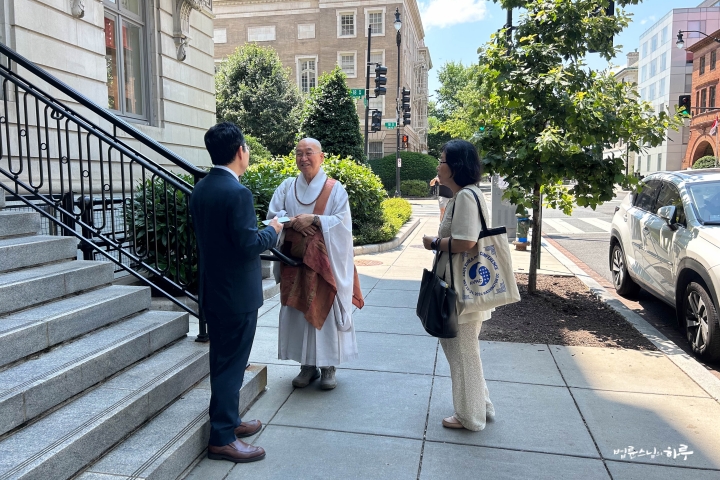
Sunim returned to the Washington DC Jungto Center after 4 PM. Finishing the schedule in the middle of the day and returning to the center was almost the first time since Sunim began visiting Washington for peace on the Korean Peninsula. Since he couldn’t have a proper lunch today, he had a meal immediately upon arrival and rested briefly before the next schedule.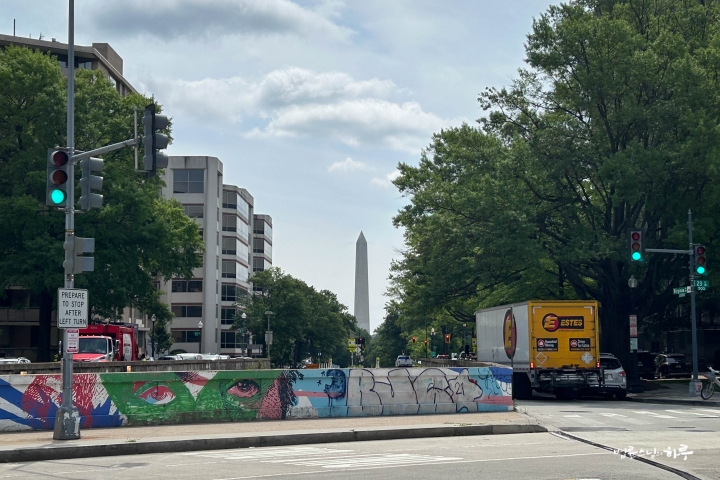
After sunset, from 7 PM, Sunim had an online conversation with members of ‘Korea Peace Now,’ a Korean Peninsula peace movement organization that has been in solidarity with Good Friends USA. Late last year, they had planned a webinar on the same topic inviting Venerable Pomnyun Sunim, but it was canceled due to scheduling conflicts. This Washington visit provided an opportunity to hold it again.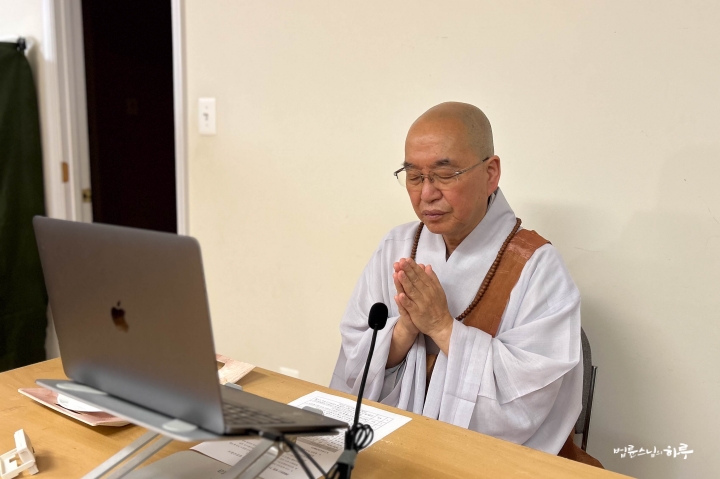
The theme of this online seminar was ‘Peace Within, Peace For Korea: Buddhist Wisdom for Sustained Activism.’ It was arranged to hear Sunim’s wisdom on how to maintain inner peace while working toward peace on the Korean Peninsula amid the rapidly changing American society and chaotic international situation. Participants with diverse religious backgrounds including Quakers, Protestants, Catholics, Buddhists, and non-religious people joined, along with first, second, and third-generation Korean Americans and non-Korean participants interested in peace on the Korean Peninsula.
The seminar began with moderation by Pastor Seulki Song, a second-generation Korean American who leads HA:N Nectar Church in New York. Sunim first briefly explained the recent situation in North Korea and the Korean Peninsula, as well as future prospects, and then immediately took questions from the audience. Participants asked questions on various topics.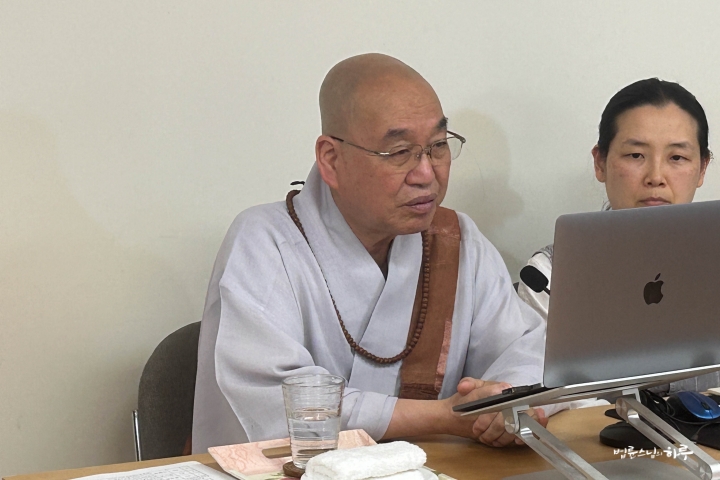
What was the background that led North Korea to develop nuclear weapons after the suspension of light water reactor construction in 1994?
What role can Koreans living abroad play for peace on the Korean Peninsula?
How committed do you think the Trump administration is to improving U.S.-North Korea relations?
While the U.S. role is important in the short term for peace on the Korean Peninsula, I think direct improvement in inter-Korean relations is more important in the long term. What do you think, Sunim?
These days, young people in South Korea are more interested in peaceful coexistence than unification. What do young people called the ‘Jangmadang generation’ in North Korea think?
Christian churches tend to be conservative and strongly anti-communist. What position does the Buddhist community take?
North Korea has maintained the position that it will not engage in dialogue as long as the United States maintains its hostile policy. Do you think the United States is currently considering policy changes? If so, in what areas could change happen first?
Participants actively exchanged questions and opinions, continuing an in-depth conversation. At the end of the seminar, a question related to today’s theme arose. One participant asked for Sunim’s view on what attitude is needed to continue sustainable peace movements. Sunim responded,
“In the short term, there are successes and failures, but in the long term, everything is just a process. And what’s important is the attitude of continuing steadily without getting tired.”
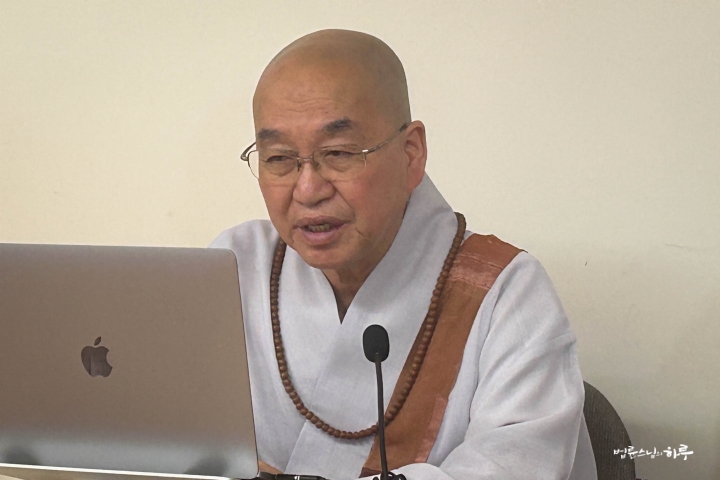
Over the past several decades, many people have made various efforts to resolve issues on the Korean Peninsula, but the situation continues without clear solutions. As a result, even experts and activists who have long worked in this field often show increasingly skeptical attitudes or appear to be growing weary. Amid this situation, many people were deeply moved by Sunim’s consistent dedication and passion over the past 30 years without tiring. They marveled at how this was possible and sought wisdom from Sunim.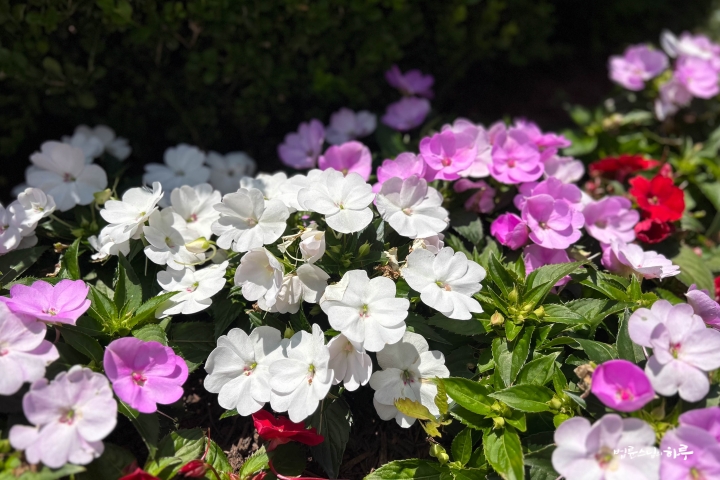
After finishing the online seminar, Sunim immediately connected to another Zoom meeting room to attend the Weekly Dharma Assembly. When all Jungto Society members had entered the video conference room, Sunim gave his greeting.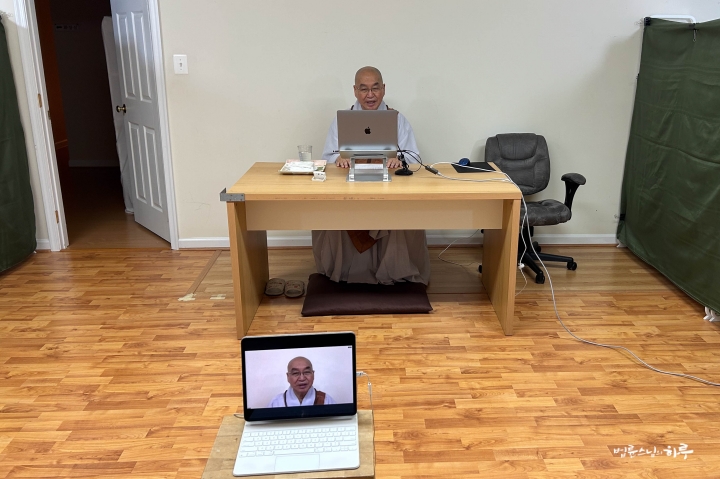
“I am currently at the US Jungto Society center in Washington D.C. It’s 9 PM local time here. Today, I visited the US State Department to examine how dialogue between North Korea and the United States is progressing. I also discussed what efforts are needed to ensure that dialogue between the two sides can continue more smoothly in the future. Additionally, I requested cooperation for the swift approval of humanitarian aid to North Korea requested by JTS. Along with this, I exchanged various opinions with local experts about North Korea’s economic situation and diplomatic position.
This Is a Turning Point for Peace on the Korean Peninsula
Through this visit to the United States, I feel that this is the most important turning point for peace on the Korean Peninsula. With the elections of President Trump in the United States and President Lee Jae-myung in South Korea, I hope this period will serve as an opportunity to end war and establish peace on the Korean Peninsula. I also think our role should be to help North Korean residents live better lives. I hope that with the precious donations you have made, we can begin humanitarian aid to North Korea and also pursue various social development projects such as agricultural development and fisheries advancement.
This year marks the 72nd anniversary of the armistice agreement. Most importantly, dialogue between North Korea and the United States must progress to end the war and move toward peaceful coexistence between South and North Korea. Rather than living with the danger of war in a hostile relationship, I believe that seeking ways to cooperate and coexist is the way we can love our country and care for our people right now.
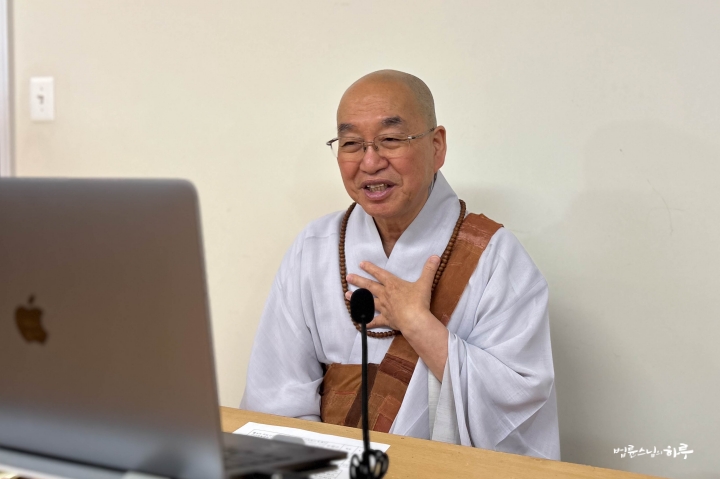
Our Role in Ending War and Establishing Peace
Although Jungto Society began as a practice organization from its inception, we have also been active with the goal of pursuing peace on the Korean Peninsula and reunification of North and South Korea as citizens of the Republic of Korea. We must acknowledge the fact that we are different from each other and view problems from a perspective that understands these differences. In other words, we should approach with a perspective of respecting and understanding the other party. If we stand on the viewpoint that only I am right and the other is wrong, it will inevitably lead to hatred and hostile attitudes. We must solve these problems according to the Buddha’s teachings of compassion and the Middle Way. Just as the government must fulfill its role, I hope we too, though our power may be small, can practice what we can do one by one.”
Following this, Sunim received questions from members online. Three people pressed the hand-raising button to ask questions and have conversations with Sunim. One of them talked about conflicts with her sister-in-law and sought Sunim’s advice on how to have compassion.
How Can I Have Compassion for My Sister-in-Law Who Attacks Me?
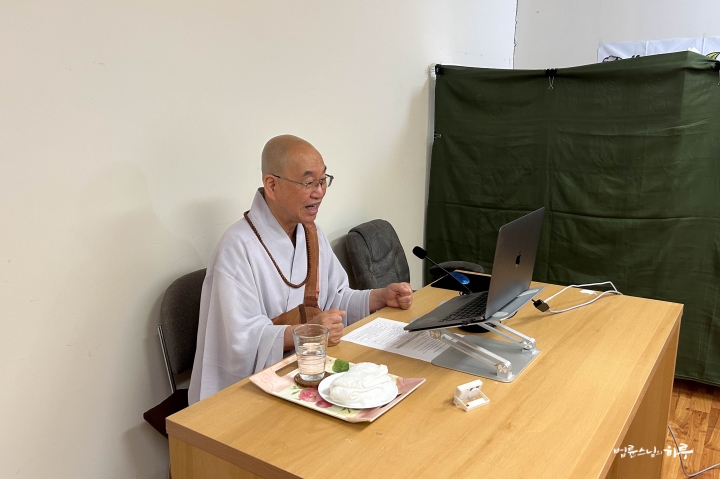
“There’s a phrase we often use these days: ‘When I do it, it’s romance; when others do it, it’s an affair.’ Your situation is exactly like that. From your sister-in-law’s perspective, your brother’s death is someone else’s business. For your sister-in-law, you are part of the in-law family, but your brother doesn’t fall into that category. You naturally think of your brother as family too, but that’s from your natal family’s perspective. From your in-laws’ perspective, you and your husband are one family, but your brother is not. So your brother’s matter might not have felt like a family matter to your in-laws. That’s why no one might have paid attention to it.
Conversely, your sister-in-law’s father-in-law’s death is not a family matter for you. While you might consider your sister-in-law as family, you didn’t see her father-in-law as family. But for your sister-in-law, it’s her father-in-law, so naturally he’s family. That’s why from your sister-in-law’s perspective, she feels ‘How could you not come when my father-in-law passed away?’ You think, ‘She didn’t even care when my brother died!’ and your sister-in-law thinks, ‘How could you not come when my father-in-law passed away?’ To a third party, it might seem like the same situation, but the parties involved can have such different perspectives.
In such cases, you can just say ‘I’m sorry’ and move on. But at that moment, you remembered what happened with your brother before, and discriminating thoughts arose. For example, let’s say you see someone illegally parked and you follow suit, but only you get a ticket. In such cases, you just pay the fine and that’s it. But if you protest saying ‘Why did only I get a ticket and not that person?’ would it be accepted? Similarly, if you think you did wrong, just say ‘I was wrong’ and apologize. But the problem is trying to prove you weren’t wrong by bringing up other examples. This is human psychology. You brought up your younger brother as your defense mechanism. ‘Was it just me? You did it too!’ It’s like that. This is not a desirable way to respond. It’s like saying ‘Why didn’t that person get a parking ticket?’ ‘Why am I being fined while that person is let off?’ While the words aren’t wrong, you can’t convince the other party this way.
Your sister-in-law can think, ‘How could you not come when my family member passed away?’ On the other hand, for you, it doesn’t feel like your family’s matter. Also, your brother’s death was such a big deal for you, but for your sister-in-law, it was someone else’s family matter. So she might not even know what she did wrong at that time. In conflicts arising from such differences in position, who is right or wrong isn’t that important. I don’t mean your sister-in-law did well, but understanding ‘From that person’s position, it could be like that’ is love and compassion. Whatever your sister-in-law says, you can accept it as ‘Maybe it’s because her family member passed away and we didn’t take care of it’ and just say ‘I’m sorry’ and move on. But if you still feel too wronged, you can say refreshingly, ‘Then why didn’t you come when my brother died?'”
“I’m too scared to do that.”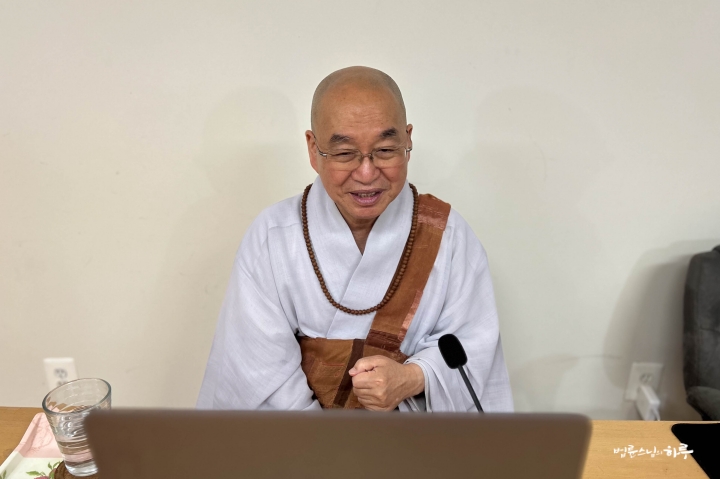
“You can confront her. Say ‘Were you the only one who did well? I did well too’ and counter back. However, that’s not the attitude a practitioner should take. If you were just an ordinary person, you might confront her thinking ‘What’s the big deal, let’s do it.’ But it’s not a desirable approach. Right now, you haven’t expressed it outwardly, but in your heart, you’re already confronting her like that. If you understand it as ‘My sister-in-law was upset because her family member passed away and we didn’t go!’ it’s not a big problem.”
“I understand well. We were the only ones among the siblings who weren’t contacted, so we couldn’t go, but I couldn’t understand why my sister-in-law was making such a fuss. Still, I didn’t want to be the same kind of person, so I composed myself and called to apologize. But my sister-in-law seemed completely unaware of her own wrongdoing, which made me even angrier. I badmouthed her internally, thinking ‘She’s such a hypocrite.’ After listening to Sunim’s words, I realize that I was also a hypocrite to my sister-in-law, and we were ultimately at the same level. I was so furious that I would wake up suddenly while sleeping, but now that feeling has subsided and I can laugh. It’s thanks to Sunim. Thank you.”
“That’s right. You really did something ridiculous. You couldn’t see your own faults but only saw others’ faults. There’s a verse in the Bible that says, ‘You see the speck in your brother’s eye but not the log in your own eye.’ It’s because you only looked at the other person and not at yourself. You just didn’t express it outwardly, but you’re ultimately the same. ‘I can be like that too. I’m like that, so my sister-in-law can be like that too.’ It’s better to understand it this way and move on with a smile.”
“Thank you.”
Questions continued. Although there was time to take more questions, Sunim ended the conversation earlier than usual due to his poor health.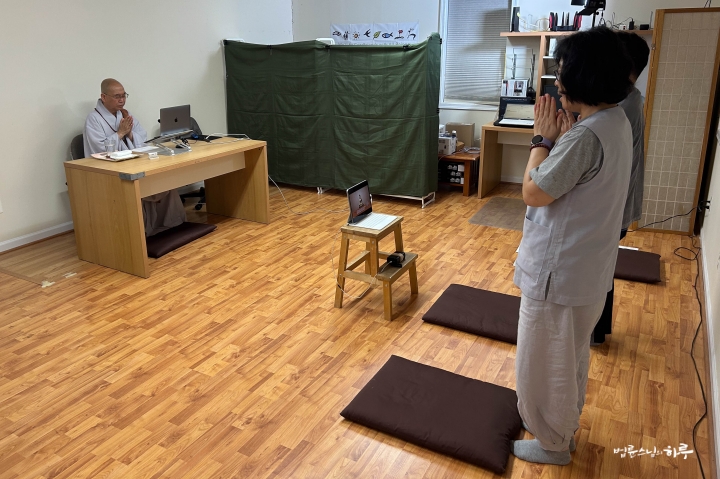
After finishing the Weekly Dharma Assembly, Sunim edited manuscripts, had a simple meal, and concluded today’s schedule.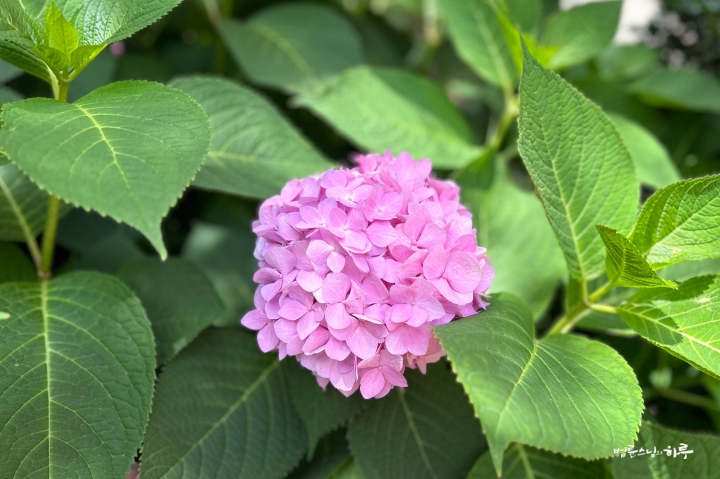
Sunim has always emphasized in Jungto Society’s 1000-Day Practice that individual change takes at least 3 years, and social change takes at least 30 years, or one generation. While many who worked together for peace on the Korean Peninsula are retiring one by one, Sunim still remains steadfast in his position. The vow made 30 years ago to help starving North Korean people continues today and will continue tomorrow.
Tomorrow, after completing all the US visit schedules, he will depart from Washington D.C. and return to Korea.






I was surprised by the different ideas and connections I found while reading this. The message about peace, unity, and communication between countries made me reflect on other areas of life as well. I believe these ideas can help in many situations—not only between nations.
Thank you to Ven. Sunim and Jungto Society for sharing this with us. 🙏🏻